【备课参考】(人教版)高中英语选修7课件:Unit 5 Travelling abroad Learning about Language(共48张PPT)
文档属性
| 名称 | 【备课参考】(人教版)高中英语选修7课件:Unit 5 Travelling abroad Learning about Language(共48张PPT) |
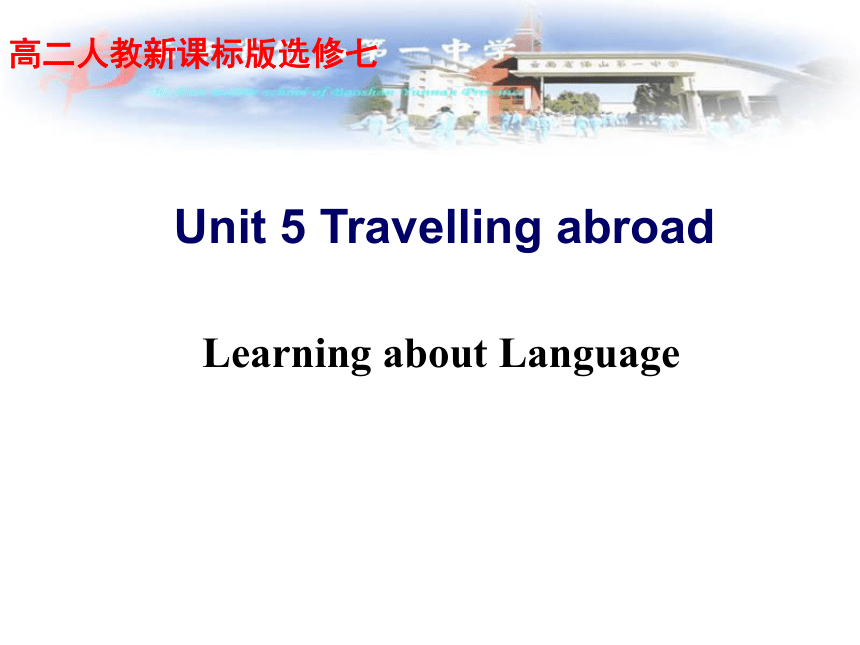
|
|
| 格式 | zip | ||
| 文件大小 | 326.4KB | ||
| 资源类型 | 教案 | ||
| 版本资源 | 人教版(新课程标准) | ||
| 科目 | 英语 | ||
| 更新时间 | 2015-08-01 00:00:00 | ||
图片预览

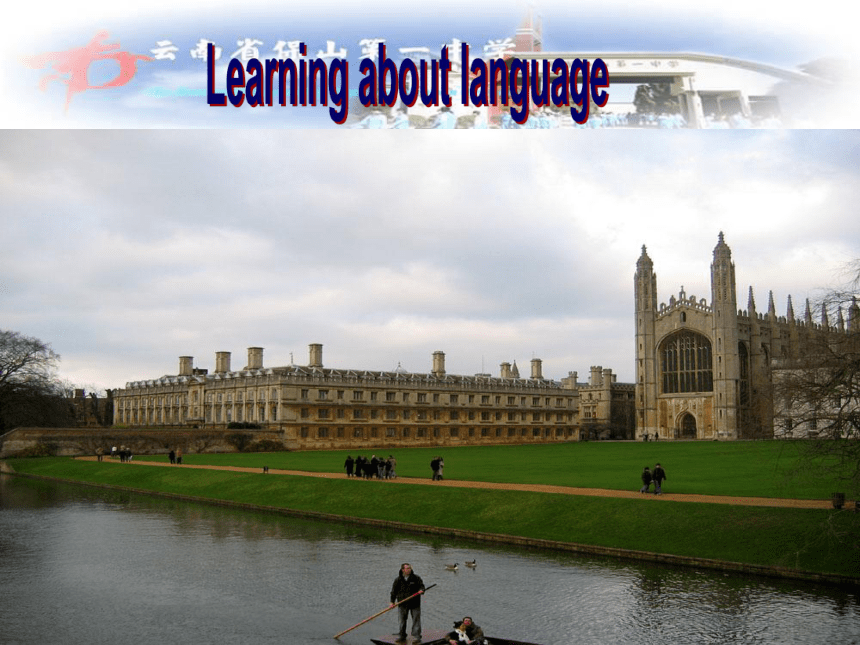
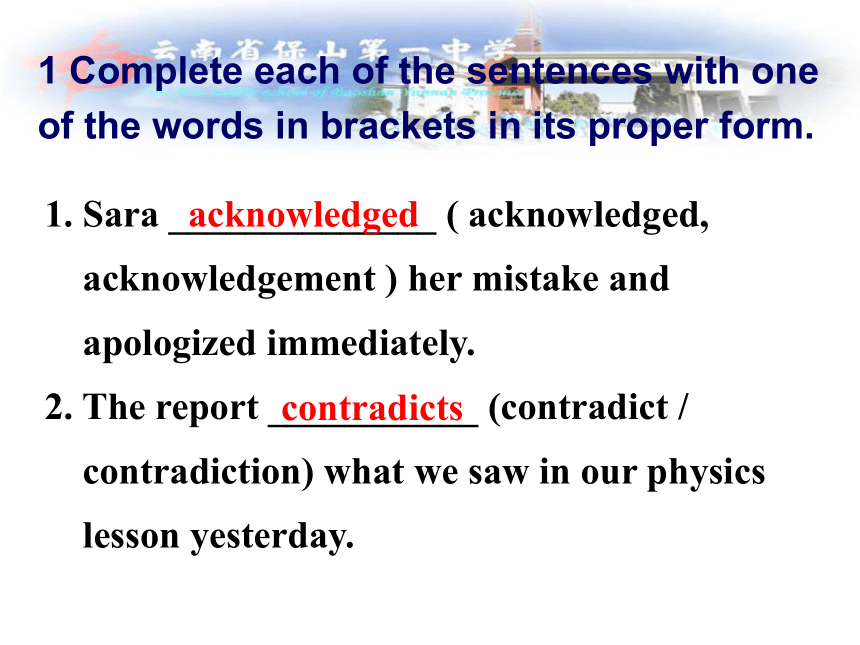
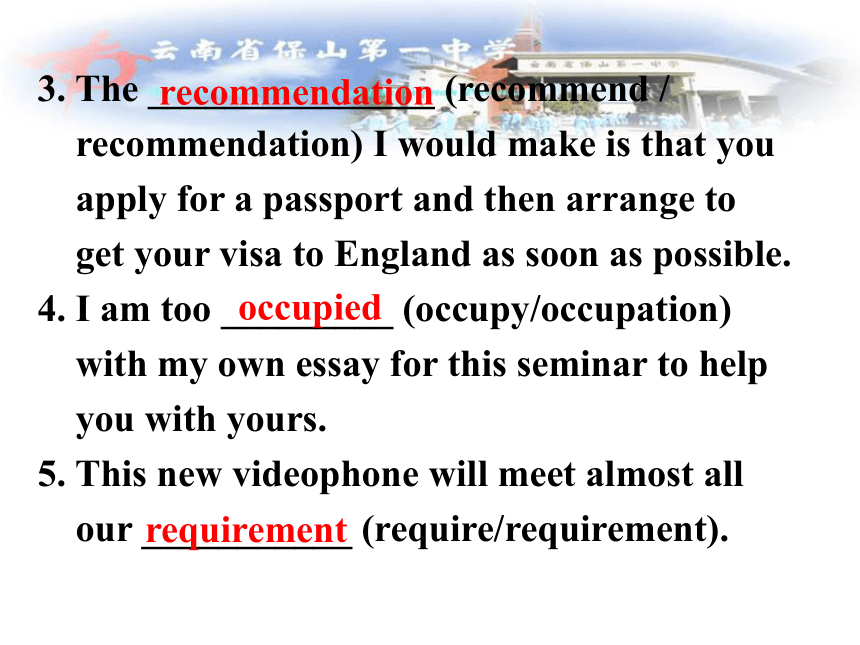
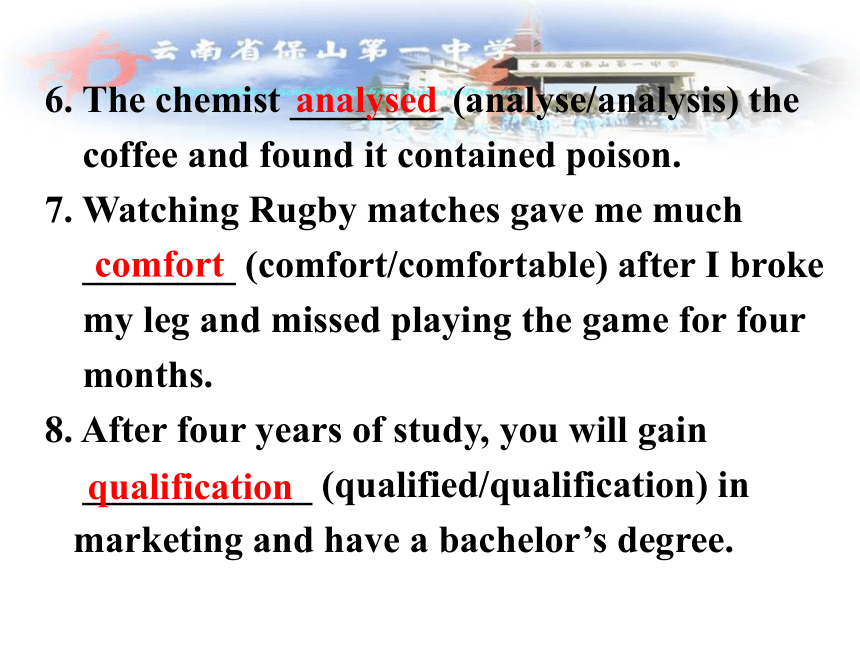
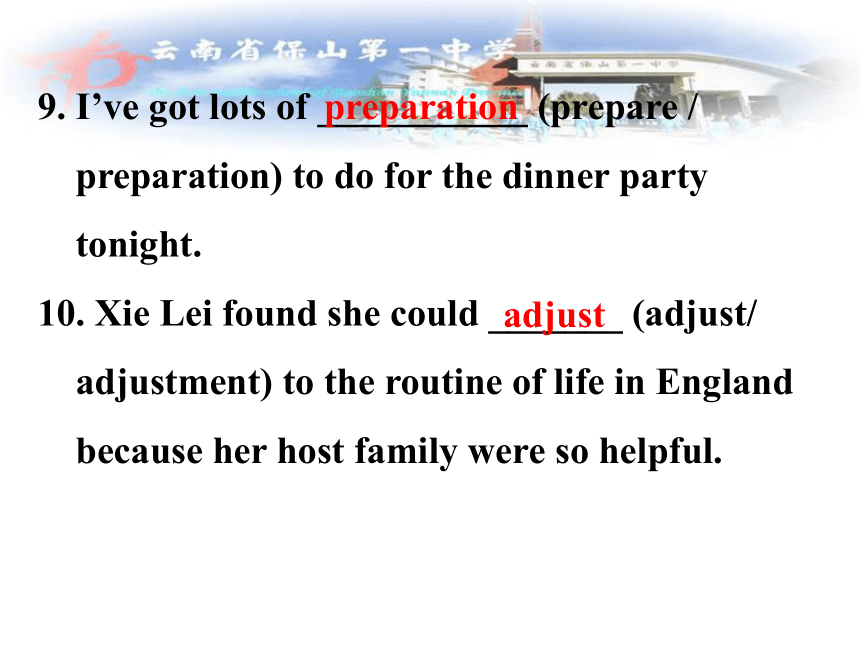
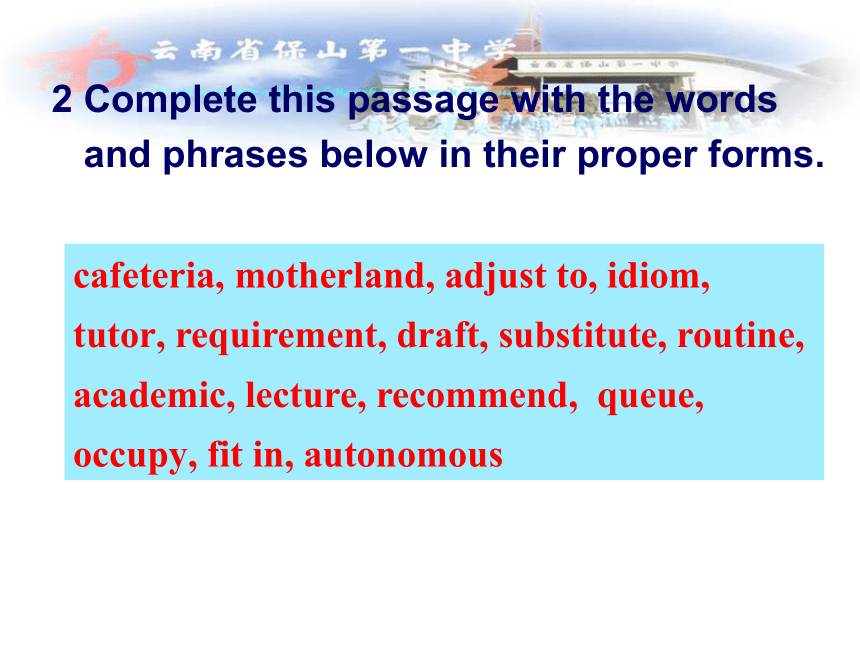
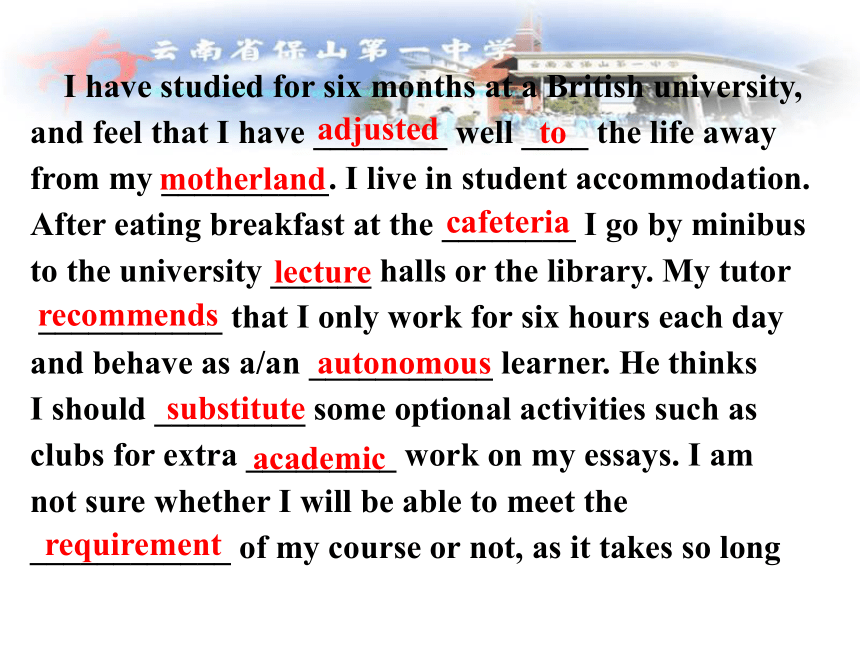
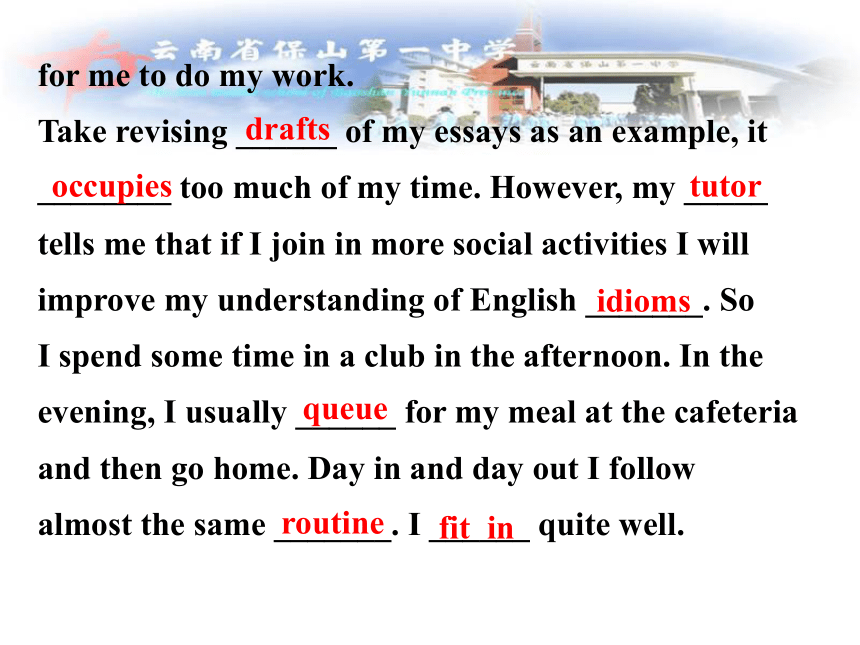
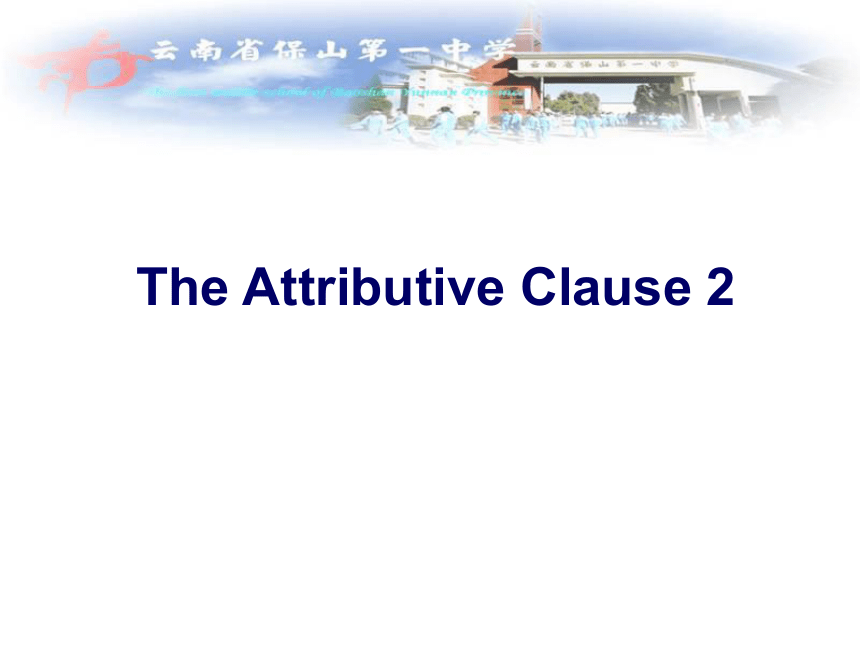
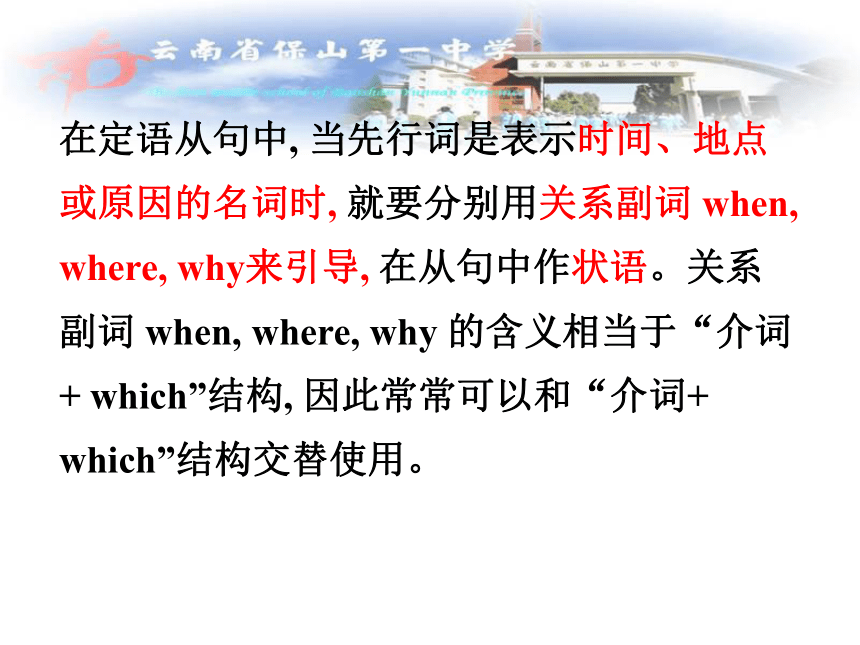
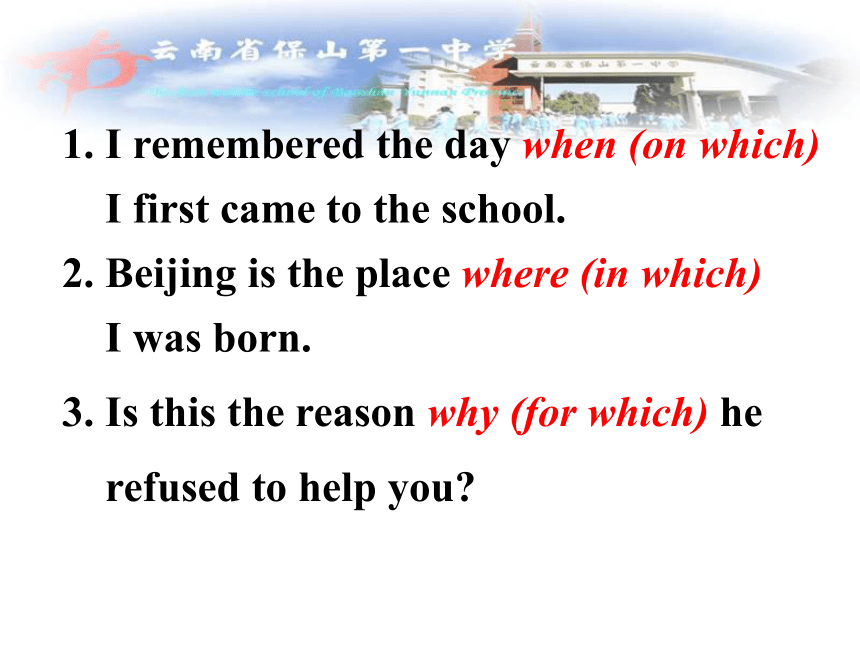
文档简介
课件48张PPT。高二人教新课标版选修七Unit 5 Travelling abroad Learning about LanguageLearning about language1 Complete each of the sentences with one
of the words in brackets in its proper form.1. Sara ______________ ( acknowledged,
acknowledgement ) her mistake and
apologized immediately.
2. The report ___________ (contradict /
contradiction) what we saw in our physics
lesson yesterday. acknowledgedcontradicts3. The _______________ (recommend /
recommendation) I would make is that you
apply for a passport and then arrange to
get your visa to England as soon as possible.
4. I am too _________ (occupy/occupation)
with my own essay for this seminar to help
you with yours.
5. This new videophone will meet almost all
our ___________ (require/requirement).recommendationoccupiedrequirement6. The chemist ________ (analyse/analysis) the
coffee and found it contained poison.
7. Watching Rugby matches gave me much
________ (comfort/comfortable) after I broke
my leg and missed playing the game for four
months.
8. After four years of study, you will gain
____________ (qualified/qualification) in
marketing and have a bachelor’s degree.analysedcomfortqualification9. I’ve got lots of ___________ (prepare /
preparation) to do for the dinner party
tonight.
10. Xie Lei found she could _______ (adjust/
adjustment) to the routine of life in England
because her host family were so helpful.preparationadjust2 Complete this passage with the words
and phrases below in their proper forms. cafeteria, motherland, adjust to, idiom,
tutor, requirement, draft, substitute, routine,
academic, lecture, recommend, queue,
occupy, fit in, autonomous I have studied for six months at a British university,
and feel that I have ________ well ____ the life away
from my __________. I live in student accommodation.
After eating breakfast at the ________ I go by minibus
to the university ______ halls or the library. My tutor
___________ that I only work for six hours each day
and behave as a/an ___________ learner. He thinks
I should _________ some optional activities such as
clubs for extra _________ work on my essays. I am
not sure whether I will be able to meet the
____________ of my course or not, as it takes so long adjusted motherlandcafeterialecturerecommendsautonomous substituteacademicrequirementtofor me to do my work.
Take revising ______ of my essays as an example, it
________ too much of my time. However, my _____
tells me that if I join in more social activities I will
improve my understanding of English _______. So
I spend some time in a club in the afternoon. In the
evening, I usually ______ for my meal at the cafeteria
and then go home. Day in and day out I follow
almost the same _______. I ______ quite well.routinedraftsoccupiestutoridiomsqueuefit in The Attributive Clause 2在定语从句中, 当先行词是表示时间、地点
或原因的名词时, 就要分别用关系副词 when,
where, why来引导, 在从句中作状语。关系
副词 when, where, why 的含义相当于“介词
+ which”结构, 因此常常可以和“介词+
which”结构交替使用。1. I remembered the day when (on which)
I first came to the school.
2. Beijing is the place where (in which)
I was born.
3. Is this the reason why (for which) he
refused to help you? 关系代词VS关系副词 选择关系代词, 还是关系副词首先要
判断先行词在定语从句中充当的成分:
关系代词一般充当主语、宾语 (whose
充当定语); 而关系副词一般充当状语。1. This is the factory where I stayed last year.
2. This is the factory which I visited last year.
3. I’ll never forget the days when I worked
with you in the city.
4. I’ll never forget the days that I spent
with you in the city.1. Is this the museum ____ you visited
a few days ago? ???
? A. where B. that
C. on which D. the one
2. Is this museum ____ you visited a few
days ago?
? A. where B. that
C. on which D. the oneB D Choose the best answer. 1. The reason ____________he gave us is enough.
2. The reason _____ he was late is unknown.
3. We must learn to act in ways ___________ do
not harm other living things.
4. I don’t like the way ______________ he talks.
5. This is the way ____________ he thought of
to solve the problem.that/which/--whythat / whichthat/in which/-that/which/--Fill in the blanks. 介词+关系代词1. 根据介词和定语从句中谓语动词的习惯搭配。
Who is the man with whom you just shook hands?
In the dark street there wasn’t a single person
_____ she could turn for help。
A. that B. who C. from whom D. to whom
析: 答案为 D 。介词 to 和定语从句中的 turn
构成固定搭配 turn to sb. for help, 意为“向
某人求助”。 D2. 根据定语从句意思的需要, 此时不但要注意
其前的搭配也要注意其后的搭配。
He had a bad cold, because of which he didn’t
attend the meeting.
In the office I never seem to have time until
after 5:30pm ____ many people have got home.
A. whose time B. that C. on which D. by which
析: 答案为 D 。根据句意“到下午 5: 30 时,
许多人已经到家了”, 且定语从句中又用了完
成时, 故应用介词 by。D注意1) 介词后面的关系词不能省略。
2) that 前不能有介词。
3) 某些在从句中充当时间,地点或原因状语
的“介词+关系词“结构可以同关系副词when,
where 和 why 互换。
This is the house in which I lived two years ago.
This is the house where I lived two years ago.4. whose可转换为“of +关系代词”型。
They live in a house, whose door opens to
the south.
They lived in a house, of which the door
opens to the south.
They lived in a house, the door of which
open to the south.1. The sun gives us heat and light, _________
which we can’t live.
2. The student ______ whom we were talking
is the best student in our class.
3. I’ll never forget the day _____ which she
said good-bye to me.aboutonwithoutFill in the blanks with proper prepositions.4. Who can give me the reason _____
which he hasn’t turned up yet?
5. In the dark street, there wasn’t a single
person _________ she could turn for help.
6. He paid the boy $10 for washing the
windows, ______________ hadn’t been
cleaned for at least a year.forto whommost of whichFor more exercises, click here.The Non-Restrictive
Attributive Clause
非限制性定语从句1. 限制性定语从句和非限制性定语从句:
限制性定语从句: 所谓限制性定语从句就是先行
词在意义上不可缺少的定语, 如果去掉, 主句就
会失去意义或意义不完整。这种从句和先行词
的关系十分密切, 写时不用逗号和主句分开。
I was the only person in my office who was
invited.
我是我们办公室唯一被邀请的人。
(如果把从句去掉, 整个句子的含义就变了)非限制性定语从句:非限制性定语从句和主句的
关系并不十分密切,只是对先行词做些附加说
明,如果去掉,主句的意思仍然清楚。这种从
句和主句之间往往用逗号隔开。在讲话时语调
上须停顿,一般不用that引导。
His dog, which was then very old, became ill and
died. 他的狗当时很老了, 生病后就死了。
(去掉从句,主句的意义仍然完整:他的狗生病
死了。) 2) Yesterday I met Li Lei, who seemed to be
very busy. 昨天我碰上李雷了,他好象很忙。
(去掉从句, 意义仍然完整: 昨天我碰上李雷了)
2. 非限制性定语从句中的一些问题:
非限制性定语从句中, 指物时, 用which而不用
that。
Football, which is a very interesting game,
is played all over the world.
2) All the books there, which have beautiful
pictures in them, were written by him.b. 指人时主格用who, 宾格用whom, 物主格用
whose (也可指物)。
Miss Howe, whom you met in the library,
is our new teacher.
2) The Arabs, who are famous for their
horses and camels, use these animals
for work and in sports.
3) Li Ming, whose mother has been ill for
two days, is absent from school today.c. 另外关系副词when (指时间), where (指地
点) 也可以引导非限制性定语从句 (注意关系
副词why不能引导非限制性定语从句); why
不引导定语从句。
He lives in the city, where there is a high
tower.
2) The People’s Republic of China was
founded in 1949, when he was born.d. 介词加关系代词也可以引导非限定性定语
从句。
1) Wu Dong, with whom I went to see the
film, enjoyed it very much.
2) Her bag, in which she put all her books,
has not been found.
3) The story about the Long March, of
which this is an example, are well written.3. as, which 非限定性定语从句
由as, which 引导的非限定性定语从句,as 和
which可代整个主句,相当于and this 或 and
that。as 一般放在句首,which在句中。
As we know, smoking is harmful to one’s
health.
The sun heats the earth, which is very
important to us.as 在定语从句中作主语、宾语、或表语。as
常用于the same...as, such... as , as... as和so...as
结构中。as 引导的定语从句常采用省略形式。
I have never seen such a lazy man as you (are).
我从来没有见过像你这样懒的人。(作表语)as引导的限制性定语从句Let children read such books as will make
them better and wiser.
让孩子们读使他们变得更好更聪明的书。
(作主语)
Take as many as you want.
你想要多少就拿多少。(作宾语)
Here is so big a stone as no man can lift.
这儿有一块没人能搬走的那么大的石头。
(作宾语)注: the same...后既可以用that 也可以用 as 来引导
定语从句, that “同一的”即指同一事物; 而后者引导
定语从句时, as “相似”即指同类事物。如:
1) This is the same pen that I lost yesterday.
(This sentence means: This pen is mine. I lost it
yesterday.)
2) This is the same pen as I lost yesterday.
(This sentence means: This pen is very much like
mine that I lost yesterday. In fact, it isn’t mine.)as 和 which 的区别 首先,as和which都可以表示主句在意义上的
连贯,在从句中作主语,或用作及物动词的
宾语。
e.g. He married her, which/as was natural.
I was very useful to him, which/as he
realized.
但下列情况下as和which一般不能互换: as 既可以指前面提到过的事实或情况, 因此as
可以放在句首、句末, 也可以插入主句中, 而which
指前面提到的事实或情况, 一般放在主句之后
(有时也可用as)。 如:
As our teacher points out, that book is of
benefit to everyone.
Heat is a form of energy, as is known to all of us.
This machine, as might be expected, has stopped
operating.2. As 含有正如、按照、正像之意, as 一般用
在肯定句中, 而 which 则可以用于含否定
意义的句子中,如:
He failed in the exam again, as was expected.
He failed in the exam again, which was
unexpected.
3. 当关系代词代表主句引起的结果,
又做主谓宾补结构中的主语时,
多用which, 如:
He saw the girl, which delighted him.
He didn’t pass the exam, which made
his mother angry.
4. 下列固定结构, 一般不能用which, 如:
as has been said before 如前所述
as often happens 正像经常发生的那样
as is well known 众所周知
as will be shown in Fig 3 将如图3所示
as we know 正如我们知道的那样
as may be imagined 这可以想象得出来
as we all can see 正如我们大家看到的那样
as follows 如下1. (2007 山东) We are just to reach a point
____ both sides will sit down together and talk.
A. where???? B. that???? C. when???? D. which
解析: 本句中先行词 a point= a stage in sth's
development 表发展的阶段、地步, 为抽象
地点, 故选关系副词where 引导定语从句。 真题解析A2. The film brought the hours back to me
_____ I was taken good care of in that
far-away village.
A. until B. that C. when D. where
解析:本题考察定语从句,主句中的先行
词the hours被其它成分分割,只要考生能
够认清真正的先行词,就不难得出答案,
the hours表示时间,所以应该选择一个
表示时间的关系副词,即when。C高考链接-- 2010 (10福建24) Stephen Hawking believes that
earth is unlikely to be the only planet _____ life
has developed gradually.
A. that B. where C. which D. whose
2. (10湖南28) I’ve become good friends with
several of the students in my school _____ I met
in the English speech contest last year.
A. who B. where C. when D. which BA高考链接-- 2009 ( 09山东 24 ) Whenever I met her, ______ was
fairly often, she greeted me with a sweet smile.
who B. which C. when D. that
2. (09宁夏海南28) She brought with her three
friends, none of _____ I had ever met before.
A. them B. who
C. whom D. theseBC1. They will fly to Washington, ____ they plan to
stay for two or three days. (2008重庆)
A. where B. there C. which D. when
2. Occasions are quite rare ____ I have the time
to spend a day with the kids. (08山东) A. who B. which C. why D. when高考链接-- 2008A D 3. I’ll give you my friend’s home address, ____
I can be reached most evenings. (08北京卷)
A. which B. when C. whom D. where
4. All the neighbor admire this family, ____
the parents are treating their child like a
friend. (2008安徽卷)
A. why B. where C. which D. thatA B 1. —Where did you get to know her?
—It was on the farm ____ we worked.
[2007 山东卷]
A. that B. there C. which D. where
2. Last week, only two people came to look at
the house, ___ wanted to buy it. [2007 安徽卷]
A. none of them B. both of them
C. none of whom D. neither of whom高考链接 -- 2007D D 3. After graduation she reached a point in her
career ______ she needed to decide what to do.
[2007 江西卷]
A. that B. what C. which D. where
4. Today, we’ll discuss a number of cases ______
beginners of English fail to use the language
properly. [2007 陕西卷]
A. which B. as C. why D. whereD D 5. Those successful deaf dancers think that
dancing is an activity _______ sight matters
more than hearing. [2007 天津卷]
A. when B. whose C. which D. where
6. Human facial expressions differ from those
of animals in the degree ______ they can be
controlled on purpose. [2007 重庆卷]
A. with which B. to which
C. of which D. for whichD B For more exercises, click here.HomeworkFind more information about the
attributive clause and remember
the rules.
of the words in brackets in its proper form.1. Sara ______________ ( acknowledged,
acknowledgement ) her mistake and
apologized immediately.
2. The report ___________ (contradict /
contradiction) what we saw in our physics
lesson yesterday. acknowledgedcontradicts3. The _______________ (recommend /
recommendation) I would make is that you
apply for a passport and then arrange to
get your visa to England as soon as possible.
4. I am too _________ (occupy/occupation)
with my own essay for this seminar to help
you with yours.
5. This new videophone will meet almost all
our ___________ (require/requirement).recommendationoccupiedrequirement6. The chemist ________ (analyse/analysis) the
coffee and found it contained poison.
7. Watching Rugby matches gave me much
________ (comfort/comfortable) after I broke
my leg and missed playing the game for four
months.
8. After four years of study, you will gain
____________ (qualified/qualification) in
marketing and have a bachelor’s degree.analysedcomfortqualification9. I’ve got lots of ___________ (prepare /
preparation) to do for the dinner party
tonight.
10. Xie Lei found she could _______ (adjust/
adjustment) to the routine of life in England
because her host family were so helpful.preparationadjust2 Complete this passage with the words
and phrases below in their proper forms. cafeteria, motherland, adjust to, idiom,
tutor, requirement, draft, substitute, routine,
academic, lecture, recommend, queue,
occupy, fit in, autonomous I have studied for six months at a British university,
and feel that I have ________ well ____ the life away
from my __________. I live in student accommodation.
After eating breakfast at the ________ I go by minibus
to the university ______ halls or the library. My tutor
___________ that I only work for six hours each day
and behave as a/an ___________ learner. He thinks
I should _________ some optional activities such as
clubs for extra _________ work on my essays. I am
not sure whether I will be able to meet the
____________ of my course or not, as it takes so long adjusted motherlandcafeterialecturerecommendsautonomous substituteacademicrequirementtofor me to do my work.
Take revising ______ of my essays as an example, it
________ too much of my time. However, my _____
tells me that if I join in more social activities I will
improve my understanding of English _______. So
I spend some time in a club in the afternoon. In the
evening, I usually ______ for my meal at the cafeteria
and then go home. Day in and day out I follow
almost the same _______. I ______ quite well.routinedraftsoccupiestutoridiomsqueuefit in The Attributive Clause 2在定语从句中, 当先行词是表示时间、地点
或原因的名词时, 就要分别用关系副词 when,
where, why来引导, 在从句中作状语。关系
副词 when, where, why 的含义相当于“介词
+ which”结构, 因此常常可以和“介词+
which”结构交替使用。1. I remembered the day when (on which)
I first came to the school.
2. Beijing is the place where (in which)
I was born.
3. Is this the reason why (for which) he
refused to help you? 关系代词VS关系副词 选择关系代词, 还是关系副词首先要
判断先行词在定语从句中充当的成分:
关系代词一般充当主语、宾语 (whose
充当定语); 而关系副词一般充当状语。1. This is the factory where I stayed last year.
2. This is the factory which I visited last year.
3. I’ll never forget the days when I worked
with you in the city.
4. I’ll never forget the days that I spent
with you in the city.1. Is this the museum ____ you visited
a few days ago? ???
? A. where B. that
C. on which D. the one
2. Is this museum ____ you visited a few
days ago?
? A. where B. that
C. on which D. the oneB D Choose the best answer. 1. The reason ____________he gave us is enough.
2. The reason _____ he was late is unknown.
3. We must learn to act in ways ___________ do
not harm other living things.
4. I don’t like the way ______________ he talks.
5. This is the way ____________ he thought of
to solve the problem.that/which/--whythat / whichthat/in which/-that/which/--Fill in the blanks. 介词+关系代词1. 根据介词和定语从句中谓语动词的习惯搭配。
Who is the man with whom you just shook hands?
In the dark street there wasn’t a single person
_____ she could turn for help。
A. that B. who C. from whom D. to whom
析: 答案为 D 。介词 to 和定语从句中的 turn
构成固定搭配 turn to sb. for help, 意为“向
某人求助”。 D2. 根据定语从句意思的需要, 此时不但要注意
其前的搭配也要注意其后的搭配。
He had a bad cold, because of which he didn’t
attend the meeting.
In the office I never seem to have time until
after 5:30pm ____ many people have got home.
A. whose time B. that C. on which D. by which
析: 答案为 D 。根据句意“到下午 5: 30 时,
许多人已经到家了”, 且定语从句中又用了完
成时, 故应用介词 by。D注意1) 介词后面的关系词不能省略。
2) that 前不能有介词。
3) 某些在从句中充当时间,地点或原因状语
的“介词+关系词“结构可以同关系副词when,
where 和 why 互换。
This is the house in which I lived two years ago.
This is the house where I lived two years ago.4. whose可转换为“of +关系代词”型。
They live in a house, whose door opens to
the south.
They lived in a house, of which the door
opens to the south.
They lived in a house, the door of which
open to the south.1. The sun gives us heat and light, _________
which we can’t live.
2. The student ______ whom we were talking
is the best student in our class.
3. I’ll never forget the day _____ which she
said good-bye to me.aboutonwithoutFill in the blanks with proper prepositions.4. Who can give me the reason _____
which he hasn’t turned up yet?
5. In the dark street, there wasn’t a single
person _________ she could turn for help.
6. He paid the boy $10 for washing the
windows, ______________ hadn’t been
cleaned for at least a year.forto whommost of whichFor more exercises, click here.The Non-Restrictive
Attributive Clause
非限制性定语从句1. 限制性定语从句和非限制性定语从句:
限制性定语从句: 所谓限制性定语从句就是先行
词在意义上不可缺少的定语, 如果去掉, 主句就
会失去意义或意义不完整。这种从句和先行词
的关系十分密切, 写时不用逗号和主句分开。
I was the only person in my office who was
invited.
我是我们办公室唯一被邀请的人。
(如果把从句去掉, 整个句子的含义就变了)非限制性定语从句:非限制性定语从句和主句的
关系并不十分密切,只是对先行词做些附加说
明,如果去掉,主句的意思仍然清楚。这种从
句和主句之间往往用逗号隔开。在讲话时语调
上须停顿,一般不用that引导。
His dog, which was then very old, became ill and
died. 他的狗当时很老了, 生病后就死了。
(去掉从句,主句的意义仍然完整:他的狗生病
死了。) 2) Yesterday I met Li Lei, who seemed to be
very busy. 昨天我碰上李雷了,他好象很忙。
(去掉从句, 意义仍然完整: 昨天我碰上李雷了)
2. 非限制性定语从句中的一些问题:
非限制性定语从句中, 指物时, 用which而不用
that。
Football, which is a very interesting game,
is played all over the world.
2) All the books there, which have beautiful
pictures in them, were written by him.b. 指人时主格用who, 宾格用whom, 物主格用
whose (也可指物)。
Miss Howe, whom you met in the library,
is our new teacher.
2) The Arabs, who are famous for their
horses and camels, use these animals
for work and in sports.
3) Li Ming, whose mother has been ill for
two days, is absent from school today.c. 另外关系副词when (指时间), where (指地
点) 也可以引导非限制性定语从句 (注意关系
副词why不能引导非限制性定语从句); why
不引导定语从句。
He lives in the city, where there is a high
tower.
2) The People’s Republic of China was
founded in 1949, when he was born.d. 介词加关系代词也可以引导非限定性定语
从句。
1) Wu Dong, with whom I went to see the
film, enjoyed it very much.
2) Her bag, in which she put all her books,
has not been found.
3) The story about the Long March, of
which this is an example, are well written.3. as, which 非限定性定语从句
由as, which 引导的非限定性定语从句,as 和
which可代整个主句,相当于and this 或 and
that。as 一般放在句首,which在句中。
As we know, smoking is harmful to one’s
health.
The sun heats the earth, which is very
important to us.as 在定语从句中作主语、宾语、或表语。as
常用于the same...as, such... as , as... as和so...as
结构中。as 引导的定语从句常采用省略形式。
I have never seen such a lazy man as you (are).
我从来没有见过像你这样懒的人。(作表语)as引导的限制性定语从句Let children read such books as will make
them better and wiser.
让孩子们读使他们变得更好更聪明的书。
(作主语)
Take as many as you want.
你想要多少就拿多少。(作宾语)
Here is so big a stone as no man can lift.
这儿有一块没人能搬走的那么大的石头。
(作宾语)注: the same...后既可以用that 也可以用 as 来引导
定语从句, that “同一的”即指同一事物; 而后者引导
定语从句时, as “相似”即指同类事物。如:
1) This is the same pen that I lost yesterday.
(This sentence means: This pen is mine. I lost it
yesterday.)
2) This is the same pen as I lost yesterday.
(This sentence means: This pen is very much like
mine that I lost yesterday. In fact, it isn’t mine.)as 和 which 的区别 首先,as和which都可以表示主句在意义上的
连贯,在从句中作主语,或用作及物动词的
宾语。
e.g. He married her, which/as was natural.
I was very useful to him, which/as he
realized.
但下列情况下as和which一般不能互换: as 既可以指前面提到过的事实或情况, 因此as
可以放在句首、句末, 也可以插入主句中, 而which
指前面提到的事实或情况, 一般放在主句之后
(有时也可用as)。 如:
As our teacher points out, that book is of
benefit to everyone.
Heat is a form of energy, as is known to all of us.
This machine, as might be expected, has stopped
operating.2. As 含有正如、按照、正像之意, as 一般用
在肯定句中, 而 which 则可以用于含否定
意义的句子中,如:
He failed in the exam again, as was expected.
He failed in the exam again, which was
unexpected.
3. 当关系代词代表主句引起的结果,
又做主谓宾补结构中的主语时,
多用which, 如:
He saw the girl, which delighted him.
He didn’t pass the exam, which made
his mother angry.
4. 下列固定结构, 一般不能用which, 如:
as has been said before 如前所述
as often happens 正像经常发生的那样
as is well known 众所周知
as will be shown in Fig 3 将如图3所示
as we know 正如我们知道的那样
as may be imagined 这可以想象得出来
as we all can see 正如我们大家看到的那样
as follows 如下1. (2007 山东) We are just to reach a point
____ both sides will sit down together and talk.
A. where???? B. that???? C. when???? D. which
解析: 本句中先行词 a point= a stage in sth's
development 表发展的阶段、地步, 为抽象
地点, 故选关系副词where 引导定语从句。 真题解析A2. The film brought the hours back to me
_____ I was taken good care of in that
far-away village.
A. until B. that C. when D. where
解析:本题考察定语从句,主句中的先行
词the hours被其它成分分割,只要考生能
够认清真正的先行词,就不难得出答案,
the hours表示时间,所以应该选择一个
表示时间的关系副词,即when。C高考链接-- 2010 (10福建24) Stephen Hawking believes that
earth is unlikely to be the only planet _____ life
has developed gradually.
A. that B. where C. which D. whose
2. (10湖南28) I’ve become good friends with
several of the students in my school _____ I met
in the English speech contest last year.
A. who B. where C. when D. which BA高考链接-- 2009 ( 09山东 24 ) Whenever I met her, ______ was
fairly often, she greeted me with a sweet smile.
who B. which C. when D. that
2. (09宁夏海南28) She brought with her three
friends, none of _____ I had ever met before.
A. them B. who
C. whom D. theseBC1. They will fly to Washington, ____ they plan to
stay for two or three days. (2008重庆)
A. where B. there C. which D. when
2. Occasions are quite rare ____ I have the time
to spend a day with the kids. (08山东) A. who B. which C. why D. when高考链接-- 2008A D 3. I’ll give you my friend’s home address, ____
I can be reached most evenings. (08北京卷)
A. which B. when C. whom D. where
4. All the neighbor admire this family, ____
the parents are treating their child like a
friend. (2008安徽卷)
A. why B. where C. which D. thatA B 1. —Where did you get to know her?
—It was on the farm ____ we worked.
[2007 山东卷]
A. that B. there C. which D. where
2. Last week, only two people came to look at
the house, ___ wanted to buy it. [2007 安徽卷]
A. none of them B. both of them
C. none of whom D. neither of whom高考链接 -- 2007D D 3. After graduation she reached a point in her
career ______ she needed to decide what to do.
[2007 江西卷]
A. that B. what C. which D. where
4. Today, we’ll discuss a number of cases ______
beginners of English fail to use the language
properly. [2007 陕西卷]
A. which B. as C. why D. whereD D 5. Those successful deaf dancers think that
dancing is an activity _______ sight matters
more than hearing. [2007 天津卷]
A. when B. whose C. which D. where
6. Human facial expressions differ from those
of animals in the degree ______ they can be
controlled on purpose. [2007 重庆卷]
A. with which B. to which
C. of which D. for whichD B For more exercises, click here.HomeworkFind more information about the
attributive clause and remember
the rules.
